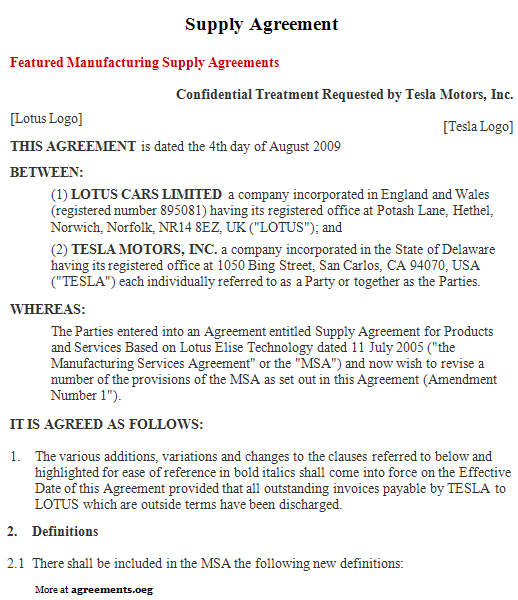A supply agreement (also known as a supplier contract) is a legal documentation of terms & condition laid down between a vendor and a purchaser of goods. The agreement is useful for companies and suppliers in order to protect their respective rights while undergoing business transactions. All the future actions in the concerned business projects are defined by using this document.
It can be an inclusive or non-inclusive document. The agreement should have terms regarding mode of payment, date & mode of delivery, product safety and security interests. Number of products to be sold and price of each should be clearly stated in the document.
When Do You Need a Supply Agreement?
The purpose of supply agreement is to resolve any conflict between parties, since both sides are obligated to follow the mutually agreed upon terms. The agreements help business owners/managers predict and plan effectively for their next course of action.
The agreement also helps any or both parties in case they want to move their business to a third party and serve connections here.
Large organizations are best suited for these agreements, but small businesses can make use of supply agreements as well. Details and clauses can be reduced/adjusted according to the situation in case of a small business. It is advisable to use the supply agreement for small businesses because it shields them from any sudden shocks that may disrupt a business in its initial stages.
Inclusions in a Supply Agreement?
Supply Agreements need to be thorough and detailed to prevent any loopholes for the welfare of both parties. To create such an agreement, company information and address is needed from the supplier and the purchaser.
Effective date of agreement, place of agreement, exclusive products and exclusive areas (for ex: certain products can be supplied in USA only) are few of the important points to cover under this agreement. A date till when the agreement is effective has to be set as well, after which none of the parties are bound by the terms.
Timeline to finalize the supply agreement may differ according to various state and national laws.
How to Draft a Supply Agreement?
Procedure for drafting a Supply Agreement:
- Determine on both ends essential information related to product and deadlines. How many units of goods can the supplier provide in a certain time period? What cost for each good is agreed upon? Whether this is an indefinite agreement or there is a time period involved.
- Draw the first draft with agreed upon terms.
- Share with both parties and get their inputs.
- Once everyone is satisfied with the terms and conditions, get signatures on multiple copies.
- Get a state or federal law to govern the agreement (notarize the documents).
Benefits of a Supply Agreement
Creating a legal document to oversee a business transaction is beneficial for both parties in the long term. Following are some reasons why:
- It saves both parties from any financial discrepancy.
- It prevents delay of product delivery or remuneration.
- Avoids any conflicts in the areas of usage of products, business with other clients for same product and any changes, if made, to the product.
- It is a good way to keep the sales and business continuous. An agreement of this kind saves both parties from surprises.
- In case of any damaged goods being delivered, this agreement can dictate the resolution.
Key Terms of a Supply Agreement
Following terms/clauses need to be included in a supply agreement:
- Supply and Purchase of Products – A clause about adhering to the document
- Orders– List of products to be purchased.
- Supply Forecasts– Timeline by the supplier for delivery of products.
- Delivery– Set date, time and mode of delivery of the products.
- Acceptance– Timeline to accept or reject an order.
- Inspection and Notice– Accepted inspection terms and notice period.
- Pricing– Price of every product to be announced before the transaction. Full disclosure of variables that may lead to change in price.
- Term– What period of time is to be counted as a term for the agreement.
- Renewal – What is the renewal policy.
- Enforceability– Who oversees the enforcement of the agreement.
- Warranty– What are the terms and conditions for warranty of products.
- Confidentiality – What information is to remain between the two parties.
- Termination – What conditions will lead to termination of the agreement.
- Payment Obligations – What are the payment obligations for each delivery.
[Also Read: Inventory Supply Agreement]
Protect your business against financial and other surprises by entering into a legal agreement.
You may choose to visit a lawyer for the drafting process or you can take the simpler path. Get a sample supply agreement here and customize it according to your business needs.
Sample Supply Agreement
